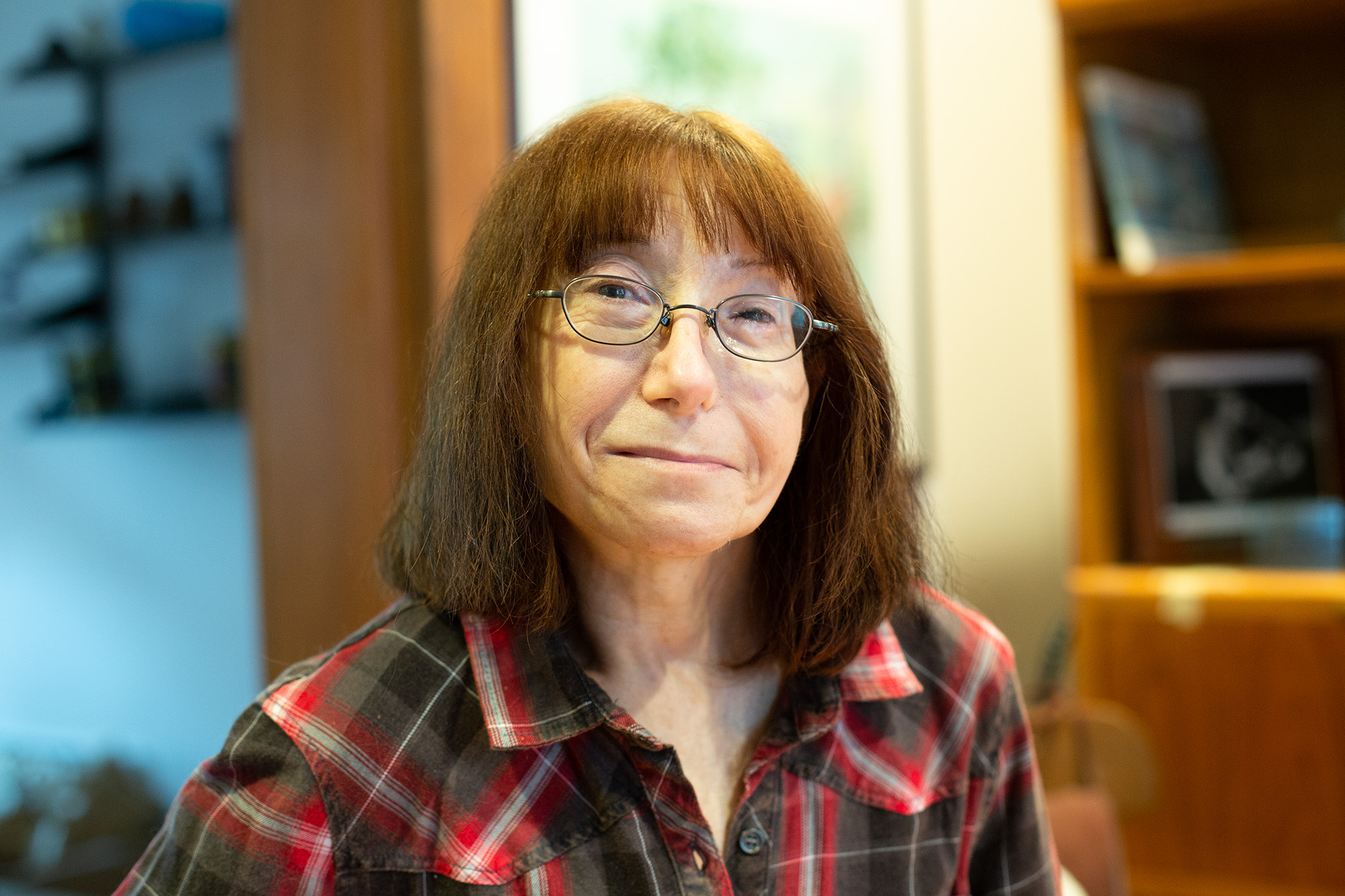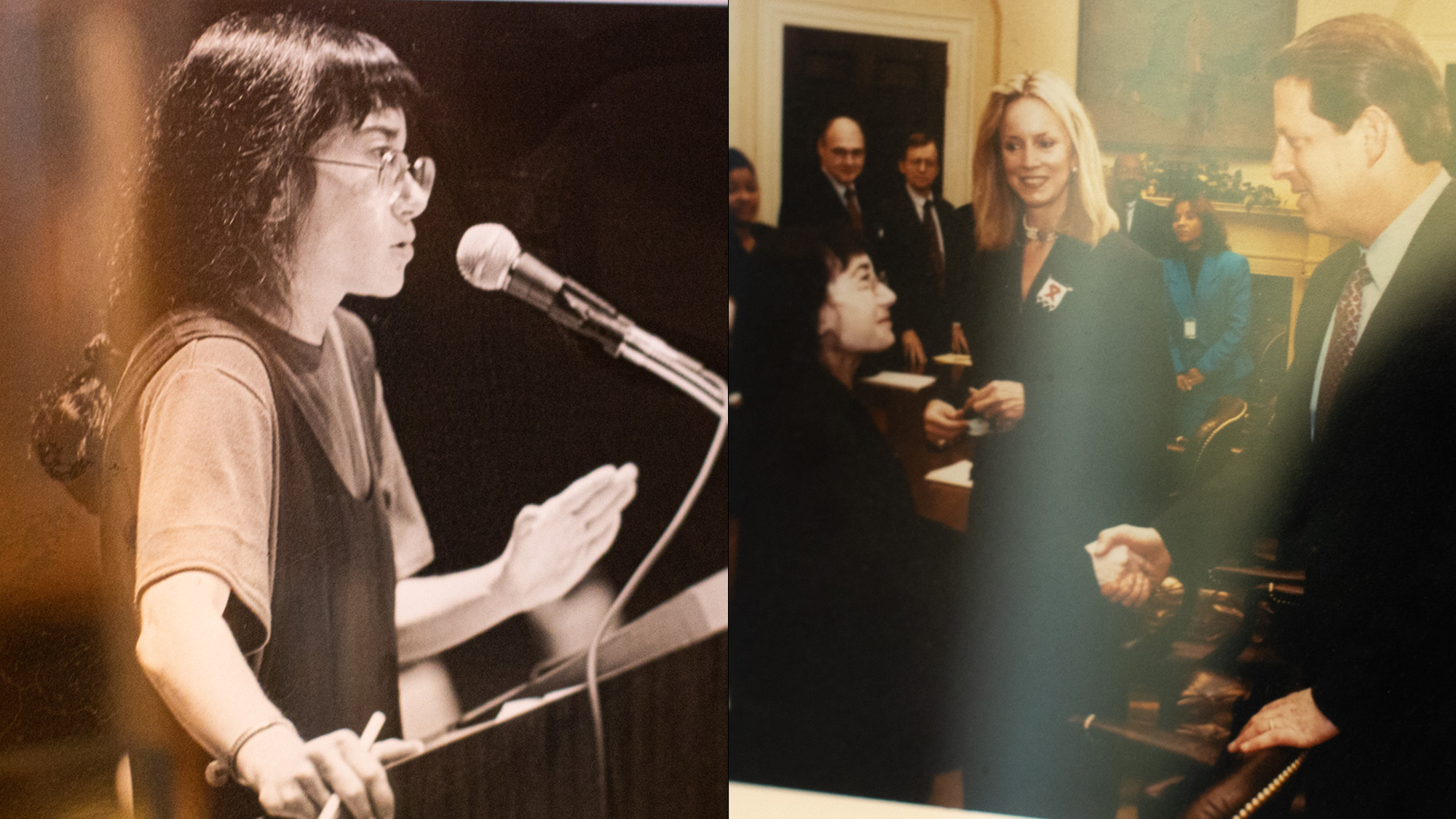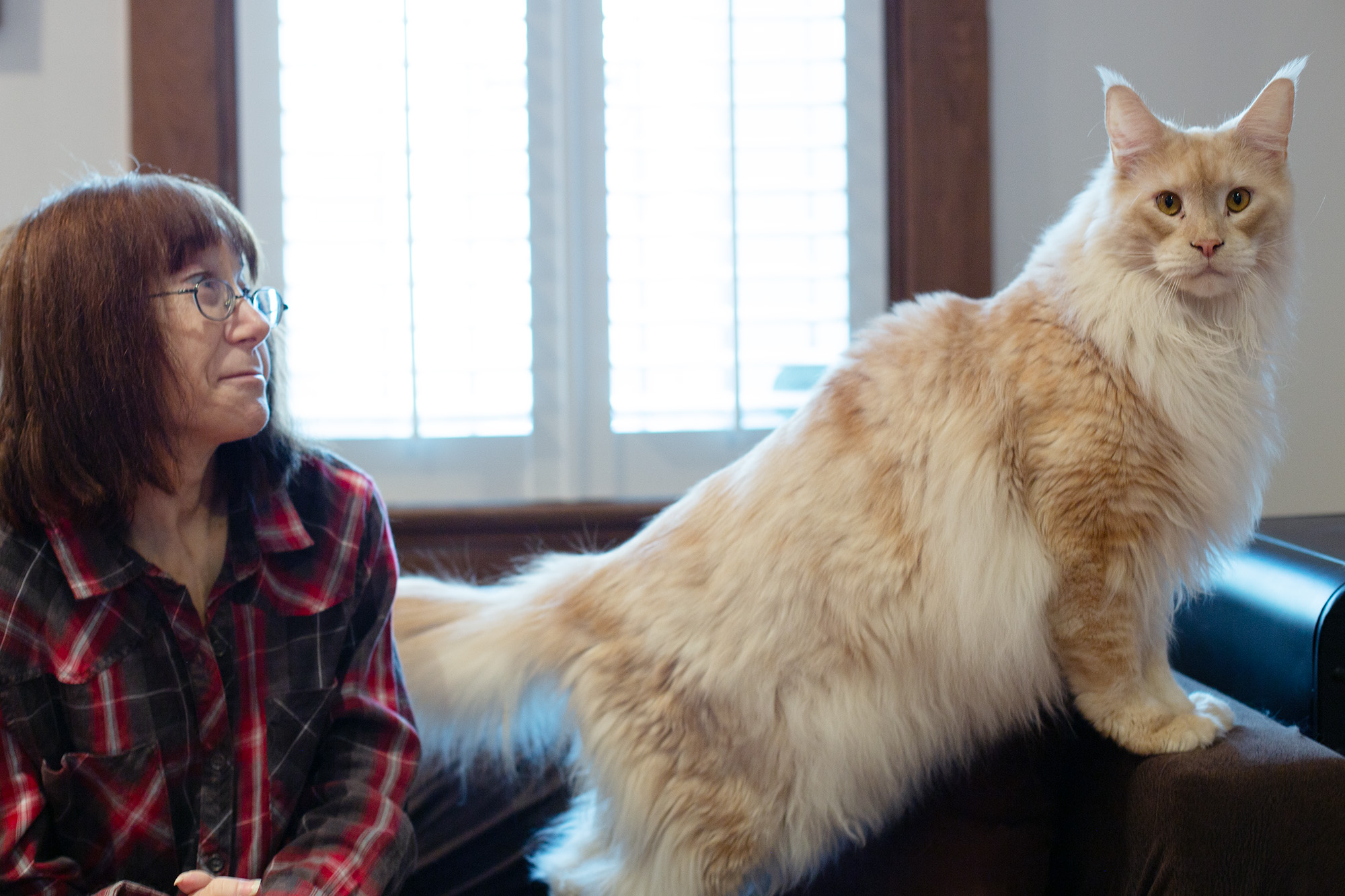Aimee Berenson Is A Changemaker Who Referred People Living With HIV/AIDS To Food & Friends In The 90’s, Today She Counts On Our Deliveries Herself
< See all posts
Aimee Berenson is a one-of-a-kind lawyer and Washingtonian. She spent decades working on landmark legislation to protect persons living with HIV/AIDS, and she was one of the best. But if you met her, she would not boast about that. In her younger days, she was a fearless, outspoken legal advocate. At the very beginning of the epidemic in the 1980s, Aimee worked with GMHC (formerly Gay Men's Health Crisis). She held a key leadership role at the AIDS Action Council from 1993 to 2001, and even advised member organization Whitman Walker Health. Aimee’s story and the origins of Food & Friends are intertwined.
Today, she lives in Northwest D.C., in an early century row-house with Max, her beautiful white Maine Coon cat, a gift from a good friend. She is living with major heart and respiratory disease and receiving medically tailored meals and nutrition counseling from Food & Friends. We had the honor of spending a winter afternoon with her and Max, and hearing some of her stories.
Aimee exudes humility, though if you ask her enough questions, you will discover that her life story and career are worthy of a best-seller. Aimee says, “looking back, if you have some skills and talents, you want to use them to help the kind of people who can’t afford the help they need.”
In those days, it was common for people living with AIDS to be illegally evicted from their homes, abandoned by their families, and left homeless. Aimee had seen the devastation this caused firsthand in the subway tunnels and avenues of New York City. The suffering she witnessed inspired the fierceness she used to pursue justice. She began in a small office in the city with three other attorneys, and they worked side by side in a small, rented room on one big plastic table.
Aimee had found a cause she was passionate about and a way to use her gifts; she informed her work through interviews with people living with HIV/AIDS. She patiently learned about their hopes and fears and uncovered the extreme inequities they experienced. She then used their stories to directly translate their voices into groundbreaking legal memos, which she would write and help advance through the legislature.
Aimee led the way in setting up a series of meetings with Henry Cisneros, the 10th Secretary of Housing and Urban Development (HUD) who worked in the administration of President Bill Clinton. The goal was to enable Mr. Cisneros to directly hear the voices of people living with HIV/AIDS, so they could explain the barriers they had to housing to him, and why they so desperately needed support and legal protection.
She authored reports for Secretary Cisneros in favor of the creation of an internal HIV/AIDS office at HUD to coordinate its AIDS housing programs. It was 1994. At the time, AIDS was the leading cause of death for all Americans ages 25 to 44. The most important HUD program making grants to local communities, States, and nonprofit organizations for projects that benefit low-income persons living with HIV/AIDS and their families was in serious jeopardy of being eliminated. Aimee and her colleagues stopped that from happening.

Aimee speaking at an HIV/AIDS conference in the early 1990s; and meeting with Vice President Al Gore. Aimee later worked with President Joe Biden on health policy when he was a Senator.
In 1990, there were only $75 million in grants per year for AIDS housing projects. By the end of 1994, thanks to the work of Aimee and her colleagues, the United States Congress and the United States Senate voted to increase the funding to $186 million. In response to the meetings Aimee and her team of activists organized, Mr. Cisneros determined that HUD would move forward to launch the new HIV/AIDS office dedicated to improving the planning and implementation of these vital programs. Aimee and her colleagues on the National AIDS Steering Committee had won.
“I took joy in kicking down the doors for people with HIV/AIDS to tell their own stories. Secretary Cisneros trusted me to draft legislation and testify to translate the needs people were having into programs and funding. He was right on board,” recalls Aimee. Mr. Cisneros would go on to have a recurring meeting with Aimee and a cadre of AIDS activists once a month on Saturday’s. Aimee felt like it was her job to make sure the legislative documents she was drafting originated from the voices of the individuals being impacted.
Thousands of people living with HIV/AIDS would keep their homes thanks to this work. The median survival period for those diagnosed with AIDS at the time was still only about two and a half years. This gave them a chance to live and die in dignity in their own homes, even if they had been removed from their jobs and lost their livelihoods.
Andrew Cuomo was the assistant secretary of HUD at the time. Aimee's colleague Keith Cylar took him into the subway tunnels to show him where people living with HIV/AIDS were living. He questioned Keith for doing this work alone and told Aimee it was dangerous and wanted them to stop. Aimee responded, “how else do you expect us to advocate for these men and make their voices heard, sir?”
An old photo in her living room shows her standing poised, with a cascade of jet-black hair, at a podium speaking at the National AIDS Housing Conference in June of 1997. She told the audience, “You have the power to affect change, you can speak for yourself, you can advocate.”
Aimee remembers the devastation caused in the days when AIDS was referred to as “GRID,” an acronym that stood for “gay-related immune deficiency.” She remembers when Haitian Americans were the targets of discrimination after the U.S. Centers for Disease Control hastily listed Haitians as one of the four “high-risk” groups for AIDS. Americans of Haitian descent were removed from their jobs and had their applications for mortgages or college admissions denied. Aimee took on many discrimination cases like this, and she and her team were able to win every case that came before them with few exceptions.
Aimee was born with some congenital health conditions and had open heart surgery when she was just a kid, but despite the health barriers she faced, she became a hero for those she served. She is 5 feet tall, but her presence is grand. She radiates purpose.
Though she has serious chronic health issues, everything about her demonstrates resilience, confidence, and bravery. During her career, she became a visible legal advocate for the rights of persons living with HIV/AIDS. She served as a recurring voice of advocacy in national publications like the New York Times, The Chicago Tribune, and the LA Times. She worked on a breadth of groundbreaking legislation during her legal career including key cases for gay rights, marriage equality, health privacy, and housing protections.
Aimee also recalls referring individuals with HIV/AIDS to Food & Friends to receive meals during her time working as an attorney in partnership with community-based organizations serving persons living with HIV/AIDS in D.C. in the 1990s. She never expected that one day she would be receiving medically tailored meals and nutritional support from Food & Friends herself.
“You never know when you are going to be the one who needs help. It is especially important to help places like Food & Friends who serve populations with specific needs. You may turn around and be the person with one of those needs someday.”
The medically tailored meals Aimee receives thanks to caring donors and volunteers are essential for her. They are also especially helpful because she is prone to seizures, so being able to microwave something is much safer than using the gas stove.
“My ability to go shopping and cook for myself is severely limited. If you do not have sufficient body fat it leads to heart failure, so this is a vital service for me. It is also not only about receiving the meals, but also having the support of a registered dietitian.” Aimee especially enjoys working with her registered dietitian Nicole Merryman from Food & Friends.
The work of Food & Friends is much more than providing healthy food. We are neighbors helping neighbors. Thanks to our supporters, we will continue this important work and lift the voices of those we serve. It is our honor to serve Aimee Berenson, and 4,899 others this year, who count on our continued support.

